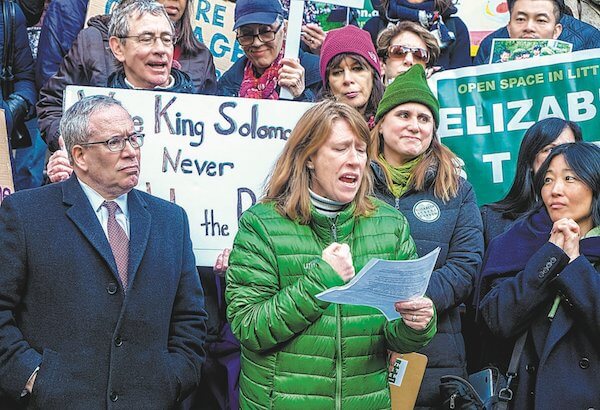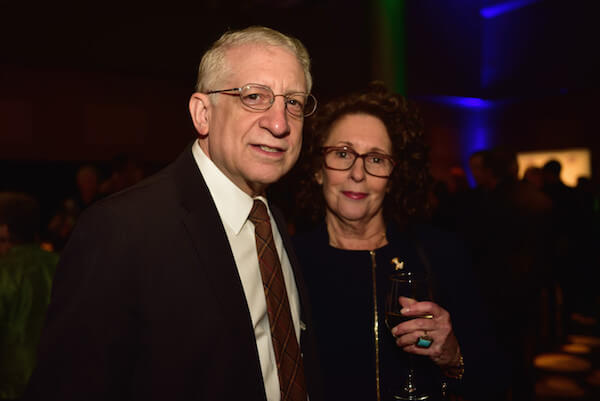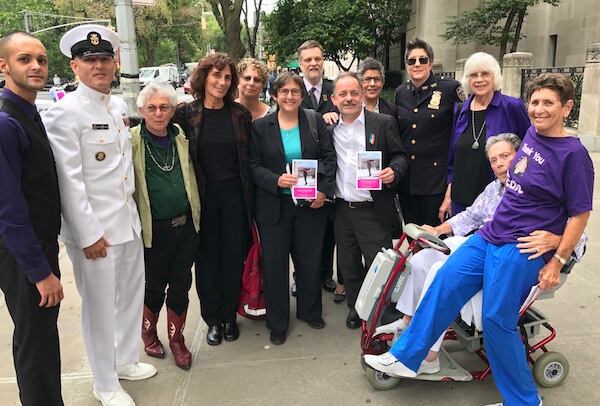Angela Meade and Michael Adams (background), and Elizabeth DeShong, Daniela Mack, and Ying Fang (foreground) in the Washington National Opera production of Handel’s “Alcina.” | SCOTT SUCHMAN/ WASHINGTON NATIONAL OPERA
A November DC weekend embraced three contrasting stories of romantic obsession. Washington National Opera returned to Handel opera after nearly a decade, with the masterpiece “Alcina” (seen November 17), aptly played on the Kennedy Center’s smaller Eisenhower stage.
Neil Patel’s simple moon-dominated set was quite fascinating, but there was precious little enchantment in Anne Bogart’s production, which presented the characters confusingly, lacked any throughline, and seemed to consist mainly of clumsy scene-by-scene blocking. Bogart also over-deployed Barney O’ Hanlon’s trivial, willowy choreography — for four energetic dancers and occasionally the otherwise somnolent, black-clad chorus, not showing good ensemble at this sixth performance — at the most distracting possible moments.
James Schuette’s choral costumes were at least handsome: they looked like stylish hipsters rather than the libretto’s beasts and rocks. The principals, apart from baritone Michael Adams (decent in Melisso’s bass tessitura), should have protested their resolutely unflattering outfits. Ying Fang and Daniela Mack’s lovely figures were obscured, and the others’ weaker points needlessly exaggerated.
“Alcina” sputters at Washington National Opera; Folger, Washington Concert Opera come through
Diminutive Elizabeth DeShong (the warrior Ruggiero) sported a comical mustard colored pantsuit with longcoat evoking Zelda Rubinstein channeling Mickey Rooney in “Sugar Babies,” and Bogart’s failure to contain DeShong’s constant semaphoric arm waving exacerbated the problem. The rising mezzo has a wonderful instrument, wide-ranged, agile, and mellow and thus well-suited to this idiom. Her smooth “Verdi prati” hit the mark, but she needs more telling phrasing and textual connection to achieve her high Handelian potential.
I’m not sure Angela Meade has Handelian potential. (AVA, where she trained, hasn’t staged a Handel work in 30 years.) It was brave of her to attempt Alcina, but apart from size of voice and spot-on trills she didn’t bring very much of use to the great role. Her heavily vibratoed top register — which can be exciting in 19th century rep — worked against her here, and she’s simply not the kind of artist who can build a nuanced character through thoughtful verbal phrasing. Like Cleopatra, Alcina must evolve; Meade remained pretty much at one dreary emotional level.
Fang (Morgana) — who sang several baroque roles while at Juilliard — and the stylistically versatile Mack (Bradamante) proved the best Handelians. The Chinese soprano emitted streams of beautiful crystalline sound, winning merited storms of applause. The fiery Argentine mezzo repeated her Santa Fe success in this coloratura-driven part. Light tenor Rexford Tester managed Oronte’s three arias with skill.
Conductor Jane Glover sensibly cut the entire character of Oberto, a disposable late addition by Handel with unmemorable music. Admirably, Glover presented all of the arias given with their full-out da capo structures — a contrast to Houston’s concurrent mounting of “Giulio Cesare,” cut to ribbons. Her reading was musicologically sound — though to my taste many of the repeats she sanctioned or obtained were too elaborate, obscuring the melodies too far. Pace flagged often in the evening’s long first half; one wanted greater instrumental daring and drive.
Handel’s Ariosto-based libretto makes it clear that Alcina’s sorcery diverted Ruggiero from his warrior path; Shakespeare in “Antony and Cleopatra” — strongly given at the Folger Theatre (November 18) — makes the uptight Romans led by Octavius say the same of Antony in relation to the suspected “other,” “Eastern” Cleopatra. But the play allows for multiple readings, and Robert Richmond’s compact production presented the sensuality and openness of Alexandria as the more compelling option, even as the headstrong lovers plunge their cause into ruin.
Cody Nickell and viola-voiced Shirine Babb exuded the sexiness and mercurial temperament to make this concept work, on an ingenious rotating set (Tony Cisek) maximizing the self-conscious theatricality of the lovers’ worldview.
Adam Stamper’s rock-flavored score sometimes got out of hand but his sound design was excellent: the text was clear, and the Romans’ rhetorical hollowness exacerbated by a cold reverb effect. Mariah Hale’s (inevitably, these days?) rather “Game of Thrones” costumes were sensational, and Andrew F. Griffin lit with subtlety.
Other fine actors — some double or treble-cast — included Chris Genebach (Agrippa) dealing expertly with the verse, Nicole King, moving as both Iras and Octavia, John Floyd (Mardian, sunnily played as Gay Best Friend), the lively Anthony Michael Martinez (Soothsayer/ Messenger/ Eros), and Dylan Paul (A & F catalog-ready but unafraid to stress the priggish brat in Octavius). Richmond’s judicious pacing guaranteed a tight evening.
In my experience the Folger is the best option for Shakespeare in the capital; “Winter’s Tale” plays March 13-April 22.
Washington Concert Opera’s offering the next evening, Bellini’s early (1829) “La straniera,” also dealt with obsessive love. Arturo, engaged to Isoletta, falls at sight for the mysterious Alaide, whom the locals consider a likely sorceress. Touched by his affections, she cannot return them, as Arturo’s friend Valdeburgo affirms — when he realizes that Alaide is the cast-off French queen, his own sister. Arturo persists in his obsession, seemingly killing Valdeburgo, for which Alaide takes the blame — until Valdeburgo appears, fine. Alaide urges Arturo to proceed with marrying Isoletta but — having invited Alaide to the ceremony — he can’t go through with it. When news comes that Alaide is to be reinvested as queen, he kills himself, having ruined two women’s lives in true Romantic fashion.
Follow that? I thought not, and that gives you some idea why it doesn’t get staged. The score has some prefigurings of the composer’s later elegiac, long-phrased style and some diverting ensembles, but not enough to be memorable. However, concert opera exists to investigate such pieces and DC is lucky to have WCO; New York has had a near-vacuum on such events since OONY stopped its mainstage offerings.
So — even if it’s no lost masterpiece — one is grateful to Antony Walker for organizing a good cast for “Straniera” and leading it with dispatch and good ensemble. The very talented soprano Amanda Woodbury, announced as under the weather, nonetheless displayed an impressive technique and much lovely vocalism. The young Renee Fleming, who flourished in this part in the 1990s, seemed to be her model; some text-based incisive phrasing of the kind Renata Scotto and Mariella Devia offer might also help bring Woodbury to another level.
Arturo, placed very high, contains pitfalls; Gerald Schneider did some sensitive and attractive singing, but one regretted the few times he virtually yelled notes intended to be taken in head voice. Best of all was suave Chilean baritone Javier Arrey, a real bel canto singer evoking the late, undervalued Pablo Elvira; he limned a gorgeous reading of “Meco tu vieni,” a piece prefiguring baritone highlights in both “La favorite” and “Ernani.”
As Isoletta — very much the seconda donna role — Corrie Stallings showed a pure, well-focused voice and dispatched her cavatina and cabaletta in fine style. Timothy Bruno’s buzzy bass sounded duly authoritative as the Prior, and tenor Jonas Hacker showed good line and projection as the squirrelly villain Osburgo.
WCO offers Donizetti’s “Maria di Rohan” on February 18.
David Shengold (shengold@yahoo.com) writes about opera for many venues.



































